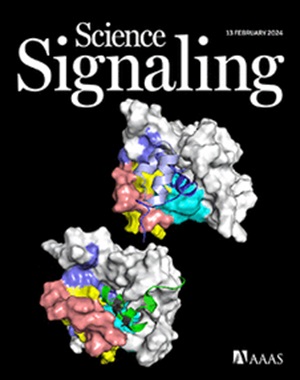生成含有 T 细胞信号基团的抗肿瘤嵌合抗原受体。
IF 6.7
1区 生物学
Q1 BIOCHEMISTRY & MOLECULAR BIOLOGY
引用次数: 0
摘要
嵌合抗原受体(CAR)T细胞已被成功用于治疗各种血癌,但不良反应限制了其潜力。在这里,我们开发了嵌合适配蛋白(CAPs)和CAR酪氨酸激酶(CAR-TKs),其中细胞内的ζT细胞受体(TCRζ)链被细胞内蛋白结构域取代,以刺激TCRζ链下游的信号传导。CAPs含有适配器结构域和ZAP70的激酶结构域,而CAR-TKs只含有ZAP70结构域。我们假设,CAPs 和 CAR-TKs 比 CARs 更有效,因为它们可以绕过确定 TCRζ 信号阈值的步骤和上游分子的抑制调节。CAP的效力太强,在体外表现出高强直性信号。相比之下,与传统的CD19-28ζ-CAR-T细胞相比,CAR-TK在白血病NSG小鼠体内表现出很高的抗肿瘤效力,并显著提高了长期肿瘤清除率。CAR-TK 的激活方式与激酶 Lck 无关,与 28ζ-CAR 相比,其磷酸化动力学更慢,信号传导时间更长。抑制 Lck 可减轻 CAR-TK 细胞的衰竭并改善其长期功能。因此,可以利用CAR-TK不同的信号特性来提高表达抗肿瘤嵌合受体的T细胞的体内疗效。本文章由计算机程序翻译,如有差异,请以英文原文为准。
Generation of antitumor chimeric antigen receptors incorporating T cell signaling motifs
Chimeric antigen receptor (CAR) T cells have been used to successfully treat various blood cancers, but adverse effects have limited their potential. Here, we developed chimeric adaptor proteins (CAPs) and CAR tyrosine kinases (CAR-TKs) in which the intracellular ζ T cell receptor (TCRζ) chain was replaced with intracellular protein domains to stimulate signaling downstream of the TCRζ chain. CAPs contain adaptor domains and the kinase domain of ZAP70, whereas CAR-TKs contain only ZAP70 domains. We hypothesized that CAPs and CAR-TKs would be more potent than CARs because they would bypass both the steps that define the signaling threshold of TCRζ and the inhibitory regulation of upstream molecules. CAPs were too potent and exhibited high tonic signaling in vitro. In contrast, CAR-TKs exhibited high antitumor efficacy and significantly enhanced long-term tumor clearance in leukemia-bearing NSG mice as compared with the conventional CD19-28ζ-CAR-T cells. CAR-TKs were activated in a manner independent of the kinase Lck and displayed slower phosphorylation kinetics and prolonged signaling compared with the 28ζ-CAR. Lck inhibition attenuated CAR-TK cell exhaustion and improved long-term function. The distinct signaling properties of CAR-TKs may therefore be harnessed to improve the in vivo efficacy of T cells engineered to express an antitumor chimeric receptor.
求助全文
通过发布文献求助,成功后即可免费获取论文全文。
去求助
来源期刊

Science Signaling
BIOCHEMISTRY & MOLECULAR BIOLOGY-CELL BIOLOGY
CiteScore
9.50
自引率
0.00%
发文量
148
审稿时长
3-8 weeks
期刊介绍:
"Science Signaling" is a reputable, peer-reviewed journal dedicated to the exploration of cell communication mechanisms, offering a comprehensive view of the intricate processes that govern cellular regulation. This journal, published weekly online by the American Association for the Advancement of Science (AAAS), is a go-to resource for the latest research in cell signaling and its various facets.
The journal's scope encompasses a broad range of topics, including the study of signaling networks, synthetic biology, systems biology, and the application of these findings in drug discovery. It also delves into the computational and modeling aspects of regulatory pathways, providing insights into how cells communicate and respond to their environment.
In addition to publishing full-length articles that report on groundbreaking research, "Science Signaling" also features reviews that synthesize current knowledge in the field, focus articles that highlight specific areas of interest, and editor-written highlights that draw attention to particularly significant studies. This mix of content ensures that the journal serves as a valuable resource for both researchers and professionals looking to stay abreast of the latest advancements in cell communication science.
 求助内容:
求助内容: 应助结果提醒方式:
应助结果提醒方式:


